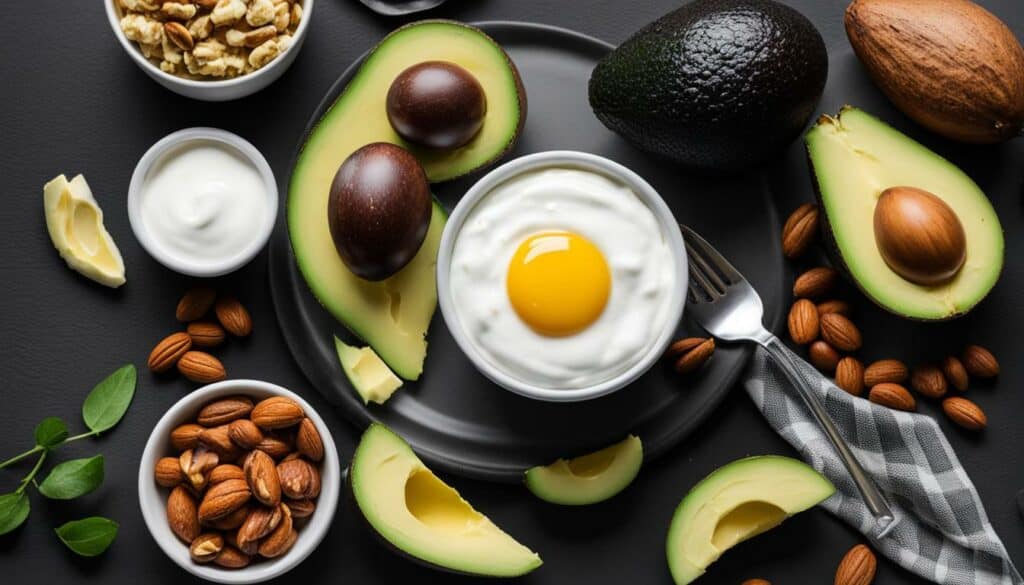Are you curious about the nutrition facts of keto-friendly yogurts and how they can benefit your ketogenic diet plan? In this section, we will dive into the essential keto yogurt nutrition facts that you need to know for your diet. Understanding the carbohydrate content, protein content, and types of keto-friendly yogurt options will help you make informed choices. Let’s explore!
Key Takeaways:
- Traditional yogurt contains moderate to high amounts of carbohydrates due to natural sugars in milk.
- Keto-friendly yogurt options include Greek yogurt, coconut milk yogurt, almond milk yogurt, and full-fat yogurt.
- Greek yogurt is lower in carbohydrates and higher in protein compared to regular yogurt.
- Coconut milk yogurt and almond milk yogurt are suitable for those on a dairy-free or plant-based keto diet.
- Full-fat yogurt can be consumed in moderation for those who can tolerate dairy.
With these key takeaways in mind, you’ll be better equipped to make informed decisions about incorporating keto-friendly yogurt into your diet.
Traditional Yogurt and Its Carbohydrate Content
Traditional yogurt, though delicious, can be high in carbohydrates due to the natural sugars present in milk. This can make it unsuitable for those following a ketogenic diet, which typically requires limiting carbohydrate intake to achieve a state of ketosis.
When examining the nutrition facts of traditional yogurt, it’s important to note that the carbohydrate content can vary depending on the brand and flavor. On average, a 6-ounce serving of regular yogurt can contain anywhere between 10 to 20 grams of carbohydrates. This can quickly add up and hinder your progress on a keto diet that aims for a low carbohydrate intake.
To give you a better understanding, here’s a table comparing the carbohydrate content of different types of traditional yogurt:
| Yogurt Type | Carbohydrate Content per 6-ounce serving |
|---|---|
| Plain Yogurt | 10-15 grams |
| Flavored Yogurt | 15-20 grams |
| Greek Yogurt | 5-10 grams |
As you can see, Greek yogurt tends to have a lower carbohydrate content compared to regular yogurt. This is because Greek yogurt undergoes a straining process to remove excess liquid, resulting in a higher protein-to-carbohydrate ratio. It can be a suitable option for those on a keto diet who still want to enjoy the creamy and tangy goodness of yogurt while keeping their carbohydrates in check.

Next, let’s move on to exploring the various keto-friendly yogurt options that can be incorporated into your diet without compromising your carbohydrate goals.
Keto-Friendly Yogurt Options
Luckily, there are several keto-friendly yogurt options that you can incorporate into your diet without compromising your carb limit. These alternatives offer lower carbohydrate content while still providing a creamy and satisfying yogurt experience. Let’s explore some of the top choices:
- Greek Yogurt: Greek yogurt is a popular option for those following a ketogenic diet. It contains less lactose, making it lower in carbohydrates compared to regular yogurt. Additionally, Greek yogurt is higher in protein, which can help keep you feeling fuller for longer.
- Coconut Milk Yogurt: If you’re looking for a dairy-free and plant-based option, coconut milk yogurt is a great choice. With its creamy texture and subtle tropical flavor, it can be a delicious addition to your keto meal plan. Just make sure to opt for unsweetened varieties to avoid any added sugars.
- Almond Milk Yogurt: Another dairy-free alternative is almond milk yogurt. Made from a blend of almonds and water, this yogurt offers a smooth and creamy texture. It’s important to choose unsweetened options to ensure minimal carbohydrates.
- Full-Fat Yogurt: For those who can tolerate dairy, full-fat yogurt can be enjoyed in moderation on a ketogenic diet. Look for varieties with minimal added sugars and stick to appropriate portion sizes to stay within your carbohydrate limit.
Remember, when selecting yogurt for your keto diet, always check the nutrition labels for carbohydrate content and opt for unsweetened varieties. You can personalize your yogurt by adding keto-friendly toppings such as sliced almonds, chia seeds, or a drizzle of sugar-free syrup. Homemade yogurt is also an option for those who want more control over the ingredients and customization.
By incorporating these keto-friendly yogurt options into your diet, you can enjoy the creamy goodness of yogurt while staying on track with your ketogenic lifestyle. Experiment with different flavors and textures to find your favorite combination, and don’t forget to savor each spoonful!
Benefits of Greek Yogurt for a Keto Diet
Greek yogurt, a popular choice among health-conscious individuals, is not only lower in carbohydrates but also higher in protein compared to regular yogurt. This makes it an excellent option for those following a keto diet, which typically requires a higher intake of protein and a significant reduction in carbohydrates.
The nutritional profile of Greek yogurt makes it an ideal choice for individuals seeking to maintain a state of ketosis. With only around 6-8 grams of carbohydrates per serving, Greek yogurt allows you to satisfy your cravings for a creamy and tangy treat without derailing your keto diet goals.
Additionally, Greek yogurt packs a powerful punch of protein. With approximately 15-20 grams of protein per serving, it helps promote feelings of fullness and supports muscle growth and repair. Protein is also essential for maintaining a healthy metabolism, which is crucial for weight management on a keto diet.

When incorporating Greek yogurt into your keto meal plan, it’s important to choose unsweetened varieties to avoid added sugars, which can disrupt ketosis. You can customize your Greek yogurt by adding keto-friendly toppings such as nuts, seeds, and berries for added flavor, texture, and nutrients.
A Table of Greek Yogurt Nutrition Facts:
| Nutrient | Amount per Serving (100g) |
|---|---|
| Calories | 56 |
| Carbohydrates | 4g |
| Protein | 10g |
| Fat | 0.4g |
| Sugar | 4g |
As you can see from the table above, Greek yogurt is not only low in carbohydrates but also provides a significant amount of protein while keeping the calorie count relatively low. This makes it an excellent choice for individuals looking to maintain a state of ketosis while enjoying a delicious and nutritious snack or meal.
Fueling your keto diet with Greek yogurt can provide you with essential nutrients, promote feelings of fullness, and support your weight loss goals. Just remember to choose unsweetened varieties and personalize your yogurt with keto-friendly toppings to stay on track.
Dairy-Free Keto Yogurt Options
If you’re on a dairy-free or plant-based keto diet, fear not! There are delicious yogurt alternatives made from coconut milk and almond milk that you can enjoy. These options provide a creamy and satisfying texture while being low in carbohydrates and suitable for your dietary needs.
Coconut milk yogurt is a popular choice for those looking for a dairy-free and keto-friendly yogurt. It is made from the creamy and rich milk of coconuts, providing a tropical flavor that pairs well with a variety of toppings. With its natural sweetness, it can be enjoyed plain or customized with keto-friendly additions like berries, nuts, or chia seeds.
Another great option is almond milk yogurt. Made from ground almonds and water, this yogurt alternative offers a subtle nutty taste and a smooth consistency. It is often fortified with additional nutrients like calcium and vitamin D, making it a nutritious choice for your keto diet. You can enhance the flavor by adding low-carb sweeteners, vanilla extract, or a sprinkle of cinnamon.
Both coconut milk yogurt and almond milk yogurt can be found in most grocery stores or easily made at home with just a few ingredients. By choosing these dairy-free alternatives, you can still enjoy the creamy goodness of yogurt while staying true to your keto lifestyle.
| Coconut Milk Yogurt | Almond Milk Yogurt |
|---|---|
| Low in carbohydrates | Low in carbohydrates |
| Creamy and rich texture | Smooth and nutty flavor |
| Source of healthy fats | Good source of calcium and vitamin D |
| Can be customized with toppings | Easy to add flavor enhancements |
Moderation with Full-Fat Yogurt for Keto
If you can tolerate dairy, full-fat yogurt can be enjoyed in moderation as part of your keto meal plan. It provides a creamy texture and rich flavor that can satisfy your cravings while still fitting into your low-carb lifestyle. The key is to choose high-quality, full-fat yogurt without added sugars or artificial ingredients.
Full-fat yogurt contains a balance of protein, fat, and carbohydrates, making it a versatile option for those following a ketogenic diet. It offers a creamy and indulgent experience, while also providing valuable nutrients like calcium, vitamin D, and probiotics.
When incorporating full-fat yogurt into your keto diet, portion control is crucial. While it may be tempting to indulge in large servings, it’s important to remember that yogurt still contains carbohydrates. Be mindful of your daily carbohydrate limit and adjust your portion sizes accordingly. Pairing full-fat yogurt with low-carb toppings like nuts, berries, or chia seeds can also add flavor and texture without adding excessive carbs.
Remember, everyone’s dietary needs and tolerances are different, so it’s essential to listen to your body and adjust your intake accordingly. If you experience any digestive discomfort or notice an impact on your ketosis, it may be best to reduce or eliminate yogurt from your diet. Always consult with a healthcare professional or registered dietitian before making any significant changes to your diet.

| Nutrition Facts (per 1 cup serving) | Full-Fat Yogurt |
|---|---|
| Calories | 150 |
| Protein | 8g |
| Fat | 8g |
| Carbohydrates | 6g |
| Sugar | 6g |
Source: USDA National Nutrient Database
Choosing the Right Yogurt for Your Keto Diet
Making the right yogurt choices for your keto diet involves checking nutrition labels, selecting unsweetened varieties, and getting creative with keto-friendly toppings. When it comes to low carb yogurt nutrition, it’s important to be mindful of the carbohydrate content. Opting for unsweetened varieties can help you reduce your sugar intake and stay within your keto goals.
One option to consider is Greek yogurt, which is known for its lower carbohydrate content and higher protein content compared to regular yogurt. It can be a satisfying and nutritious choice for those following a keto diet. Adding Greek yogurt to your meal plan can provide you with the protein you need while keeping your carbohydrate intake in check.
For those who prefer a dairy-free or plant-based approach, coconut milk yogurt and almond milk yogurt are excellent alternatives. These options are made from non-dairy sources and offer a creamy texture and delicious taste. They are suitable for individuals on a dairy-free or plant-based ketogenic diet.

When enjoying your keto-friendly yogurt, consider getting creative with toppings. Some keto-friendly options include sliced almonds, chia seeds, flaxseeds, shredded coconut, and fresh berries in moderation. These toppings can add texture, flavor, and additional nutrients to your yogurt without derailing your keto diet.
Benefits of Keto-Friendly Yogurt Toppings:
- Sliced almonds: High in healthy fats and provide a crunchy texture.
- Chia seeds: Rich in fiber and omega-3 fatty acids, adding a gel-like consistency when mixed with yogurt.
- Flaxseeds: Packed with fiber and healthy fats, they offer a nutty flavor and can aid in digestion.
- Shredded coconut: Adds a tropical taste, healthy fats, and dietary fiber.
- Fresh berries: Moderate amounts of berries like strawberries, blueberries, or raspberries can provide natural sweetness and antioxidants.
By following these tips, you can enjoy yogurt while staying on track with your keto diet. Remember to consider your carbohydrate goals, select unsweetened varieties, and customize your yogurt with keto-friendly toppings for a delicious and satisfying experience.
Homemade Yogurt for Customization
For those who enjoy a hands-on approach and want complete control over their yogurt ingredients, making homemade yogurt is a fantastic option for customization on a keto diet. Not only does it allow you to avoid any unwanted additives or sugars, but it also lets you experiment with different flavors and textures to suit your taste preferences.
Making homemade yogurt is a relatively simple process that requires minimal ingredients and equipment. All you need is a high-quality yogurt starter culture, milk (preferably full-fat for a richer consistency), and a yogurt maker or instant pot.
To get started, heat the milk to a specific temperature, usually around 180°F (82°C), to kill any bacteria that may interfere with the yogurt culture. Once the milk has cooled to around 110°F (43°C), add the yogurt starter culture and mix well. Transfer the mixture to your yogurt maker or instant pot and let it incubate for several hours, allowing the bacteria to ferment the milk and create that tangy, creamy yogurt texture.
| Ingredients: | Instructions: |
|---|---|
| 4 cups of milk (preferably full-fat) | 1. Heat the milk to 180°F (82°C) and let it cool to 110°F (43°C). |
| Yogurt starter culture | 2. Add the yogurt starter culture to the cooled milk and mix well. |
| Yogurt maker or instant pot | 3. Transfer the mixture to your yogurt maker or instant pot and incubate for several hours. |
Once your homemade yogurt is ready, you can unleash your creativity by adding keto-friendly toppings such as fresh berries, chopped nuts, chia seeds, or a drizzle of sugar-free sweeteners like stevia or monk fruit. These additions not only enhance the flavor but also provide additional nutritional benefits, making your homemade yogurt a wholesome option for your keto diet.
So why not give homemade yogurt a try? You’ll not only enjoy the satisfaction of creating your own customized yogurt but also have complete control over the ingredients, ensuring it aligns perfectly with your keto lifestyle.

Looking for even more enhanced results on your keto journey? The Keto Code program combines the power of a ketogenic diet with a focus on mitochondrial uncoupling and nutrient consumption. This innovative program takes your keto experience to the next level by incorporating strategies that stimulate mitochondrial uncoupling, leading to increased calorie expenditure and enhanced weight loss.
But what exactly is mitochondrial uncoupling, and why is it important for achieving optimal results on a ketogenic diet? Mitochondria are the powerhouses of our cells, responsible for generating energy in the form of ATP. When ketones are produced during ketosis, they stimulate mitochondria to uncouple and waste calories, resulting in increased fat burning and weight loss.

The Keto Code program goes beyond traditional ketogenic diets by not only promoting ketosis but also focusing on supporting and enhancing mitochondrial uncoupling. By incorporating specific nutrients that promote uncoupling, such as polyamines, MCTs, polyphenols, melatonin, and fiber, this program maximizes the calorie-burning potential of your body.
Additionally, the Keto Code program emphasizes the importance of balancing the gut microbiome, as a healthy gut contributes to a more efficient metabolism. By incorporating plant-based foods, whole foods, healthy fats, and a moderate intake of protein, this program optimizes gut health and supports overall well-being.
When it comes to achieving your weight loss goals on a ketogenic diet, the Keto Code program provides a comprehensive and science-backed approach. By combining the benefits of ketosis with a focus on mitochondrial uncoupling and specific nutrient consumption, this program offers enhanced results and sets you on the path to long-term success.
Conclusion
Keto-friendly yogurt can be a delicious and nutritious addition to your ketogenic diet, enabling you to enjoy the benefits of yogurt while staying within your carb limit. Traditional yogurt may not be suitable for a keto diet due to its moderate to high carbohydrate content. However, there are plenty of keto-friendly yogurt options available.
Greek yogurt is a popular choice for those following a ketogenic meal plan as it has lower carbohydrate content and higher protein content compared to regular yogurt. Coconut milk yogurt and almond milk yogurt are great alternatives for individuals on a dairy-free or plant-based keto diet.
When choosing yogurt, it’s important to check the nutrition labels for carbohydrate content and opt for unsweetened varieties. Portion control is key, and you can personalize your yogurt with keto-friendly toppings to enhance the flavor. If you prefer more control over ingredients, making homemade yogurt is a viable option.
For enhanced results on your keto journey, you may consider exploring the Keto Code program. This program combines the benefits of a ketogenic diet with more flexibility and fewer restrictions. It stimulates mitochondrial uncoupling, leading to weight loss, and emphasizes the importance of balancing the gut microbiome and consuming specific nutrients.
FAQ
Q: Is traditional yogurt suitable for a keto diet?
A: Traditional yogurt contains moderate to high amounts of carbohydrates due to natural sugars in milk, making it unsuitable for a keto diet.
Q: What are some keto-friendly yogurt options?
A: Keto-friendly yogurt options include Greek yogurt, coconut milk yogurt, almond milk yogurt, and full-fat yogurt.
Q: What are the benefits of Greek yogurt for a keto diet?
A: Greek yogurt is lower in carbohydrates and higher in protein compared to regular yogurt, making it a great addition to a keto diet.
Q: Are there dairy-free keto yogurt options available?
A: Yes, coconut milk yogurt and almond milk yogurt are suitable for those on a dairy-free or plant-based keto diet.
Q: Can full-fat yogurt be consumed on a keto diet?
A: Full-fat yogurt can be consumed in moderation for those who can tolerate dairy, but portion control is important to stay within carbohydrate limits.
Q: How can I choose the right yogurt for my keto diet?
A: When choosing yogurt, check the nutrition labels for carbohydrate content and opt for unsweetened varieties. You can also personalize your yogurt with keto-friendly toppings.
Q: Is homemade yogurt an option for a keto diet?
A: Yes, making homemade yogurt allows for more control over ingredients and customization to fit your keto diet.
Q: What is the Keto Code program?
A: The Keto Code program combines the benefits of a ketogenic diet with more flexibility and fewer restrictions. It stimulates mitochondrial uncoupling through ketones and nutrients that promote uncoupling.
Q: How can I enhance my results on a keto diet?
A: Balancing the gut microbiome and consuming polyamines, MCTs, polyphenols, melatonin, and fiber can also trigger mitochondrial uncoupling. The program emphasizes plant-based foods, whole foods, healthy fats, and moderate protein intake.
How Many Carbs are Typically Found in Soups?
Soup carbs unveiled: a comprehensive overview. The carb content in soups varies depending on the recipe ingredients, such as vegetables, grains, and legumes. Creamy soups may contain more carbs due to added ingredients like potatoes or cornstarch. Broth-based soups generally have fewer carbs. It’s essential to read nutrition labels or prepare homemade soups to track carb intake accurately.
Source Links
- https://cdn.drgundry.com/wp-content/uploads/2022/05/UnlockTheKetoCodeShoppingList-R1-1.pdf
- https://www.masalamonk.com/demystifying-keto-friendly-yogurt-options-finding-balance-in-your-low-carb-journey/
- https://paminy.com/book-summary-unlocking-keto-code-revolutionary-new-science-offers-more-benefits-without-deprivation/





Leave a Reply